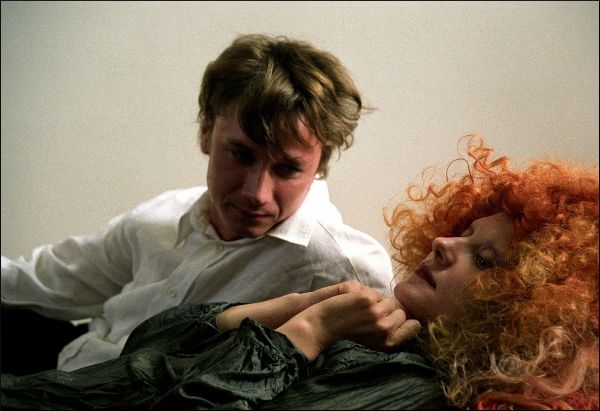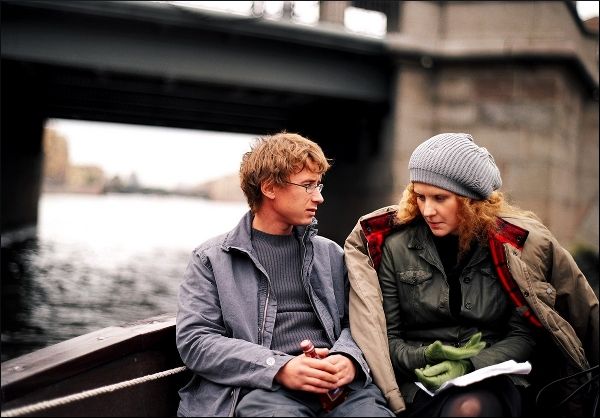It Doesn’t Hurt Me is one of those films that you will either absolutely love or utterly hate. A great deal of this has to do with the choice of leading actress: depending on the viewer’s perspective, Renata Litvinova, as Tata, can seem charming, extraordinary, eccentric, pretentious, weird, pathetic, and even revolting. It does not take long to pick a side, but this movie is worth trying out: delicate and kind, with humor and great acting.
The film’s director is a good recommendation for those who want to see truthful reflections of Russian reality during the past two decades. Alexei Balabanov, who directed Brother and Brother 2, has never painted glamorous pictures. Released in 2006, his melodrama It Doesn’t Hurt Me marked an unexpected turn in his career. In it, three young residents of St. Petersburg wish to start a business in interior design. We meet them on the doorsteps of their first client. Our protagonist, Misha, is a designer, an intelligent guy with an elegant and sometimes deliberately pompous manner of speaking. Ex-airborne Oleg is a reliable friend, straightforward in his actions and speech. Alya, the girl in the trio, is an architect. At the beginning, she seems to be vocabulary-challenged (reminding us of Ellochka the Cannibal in the classic 1928 Soviet novel The Twelve Chairs, co-authored by Ilf and Petrov). She speaks exclusively in interjections and unfinished sentences, which makes it extremely hard to comprehend her meaning. However, by the end of the film, she overcomes her difficulties due to Oleg’s efforts in socializing her.
"It Doesn’t Hurt Me is one of those films that you will either absolutely love or utterly hate."
The team meets Natella Antonovna, who lives in a huge apartment and looks like the mistress of a wealthy man. Her appearance is peculiar. She speaks in a quiet and soothing voice, like a doctor or a shrink, but has unclear intentions. In a short time, Natella and Misha fall in love, and she becomes Tata to him. Throughout the rest of the story, we closely follow their relationship and try to uncover the truth, because Tata obviously has a secret.

Tata’s out-of-place behavior fascinates us and, at the same time, puts us on guard. At a respectable social event, she puts uncorked bottles of alcohol into her plastic bag, along with salads, caviar, fried chicken, and other foods. In her study, she has an imitation of a haystack, which looks more like an enormous pile of spaghetti. She even admits it herself: “Если ты разденешься, то ты будешь похож на белого кролика со спагетти в розовом вине” (If you undress, you will look like a white rabbit with spaghetti in rose wine).
We see an interesting usage of the Russian “Вы” (a polite version of “you”) in Tata’s and Misha’s discourse. It all starts with the official “Вы” when they first meet. Then, Tata switches over to “ты” (“you” for friends and close ones), but for Misha it is a barrier to overcome. He constantly goes from “Вы” to “ты” and back again, although, from his lips, we take “Вы” to be a sign of deep appreciation and affection rather than one of detachment. And, at the moment of their possible break-up, Tata uses “Вы” again in an attempt to detach herself from her lover. Application of “Вы” and “ты” in this relationship serves as a litmus test.
"Everything points towards this love story not having a happy ending, even though we don’t know why."
Throughout the film, the question “Does it hurt?” is asked many times. It is always addressed to Misha, and he always replies “No.” At first, situations are actually harmless, but the viewer begins to anticipate that, eventually, the pain will be severe and undeniable. Everything points towards this love story not having a happy ending, even though we don’t know why. Lines like the following confirm our suspicions: “Поверь мне. Не жди со мной ничего хорошего” and “А не надо хорошего. Пусть будет так, как сейчас” (“Believe me. Don’t expect anything good from me” and “So what. Let it be the way it is now”).




